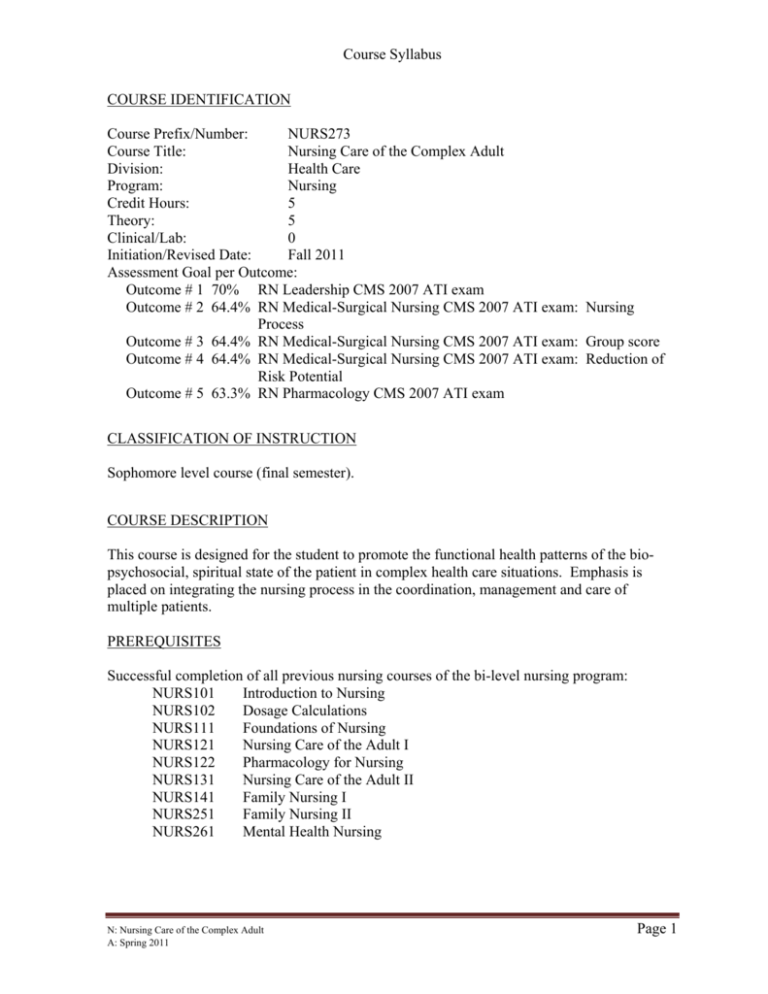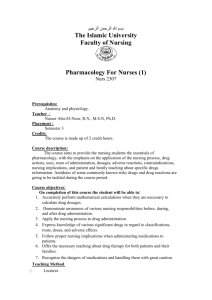
Course Syllabus
COURSE IDENTIFICATION
Course Prefix/Number:
NURS273
Course Title:
Nursing Care of the Complex Adult
Division:
Health Care
Program:
Nursing
Credit Hours:
5
Theory:
5
Clinical/Lab:
0
Initiation/Revised Date:
Fall 2011
Assessment Goal per Outcome:
Outcome # 1 70% RN Leadership CMS 2007 ATI exam
Outcome # 2 64.4% RN Medical-Surgical Nursing CMS 2007 ATI exam: Nursing
Process
Outcome # 3 64.4% RN Medical-Surgical Nursing CMS 2007 ATI exam: Group score
Outcome # 4 64.4% RN Medical-Surgical Nursing CMS 2007 ATI exam: Reduction of
Risk Potential
Outcome # 5 63.3% RN Pharmacology CMS 2007 ATI exam
CLASSIFICATION OF INSTRUCTION
Sophomore level course (final semester).
COURSE DESCRIPTION
This course is designed for the student to promote the functional health patterns of the biopsychosocial, spiritual state of the patient in complex health care situations. Emphasis is
placed on integrating the nursing process in the coordination, management and care of
multiple patients.
PREREQUISITES
Successful completion of all previous nursing courses of the bi-level nursing program:
NURS101
Introduction to Nursing
NURS102
Dosage Calculations
NURS111
Foundations of Nursing
NURS121
Nursing Care of the Adult I
NURS122
Pharmacology for Nursing
NURS131
Nursing Care of the Adult II
NURS141
Family Nursing I
NURS251
Family Nursing II
NURS261
Mental Health Nursing
N: Nursing Care of the Complex Adult
A: Spring 2011
Page 1
Course Syllabus
COREQUISITE
NURS274
Clinical Care of the Complex Adult
TEXTS
*The official list of textbooks and materials for this course are found on Inside NC.
∞ The E-book package is only available from the publisher through the college bookstore.
∞ Ackley, Betty J. and Ladwig, Gail B. Nursing Diagnosis Handbook, 8th ed., Mosby, Inc.,
St. Loius, MO, 2008. ISBN 978-0-323-04826-2
Curren, Anna M. Dimensional Analylsis for Meds, 3rd ed., Delmar, Albany, NY, 2006.
ISBN 1-4018-7801-6
∞ Elkin, Martha Keene; Perry, Anne Griffin; & Potter, Patricia A. Nursing Interventions &
Clinical Skills, 4rd ed., Mosby, Inc., St. Louis, MO, 2007. ISBN 978-0-323-04458-5
Holland, Jr., Leland and Adams, Michael. Core Concepts in Pharmacology, 2nd edition,
Pearson/Prentice Hall, Upper Saddle River, NJ, 2007. ISBN 978-0-13-171473-1
∞Ignatavicius, Donna and Workman, M. Medical-Surgical Nursing: Patient-Centered
Collaborative Care, 6th ed. Elsevier, St. Louis, MO, 2010. (F2009) ISBN 978-1-4160-3762-0
Schuster, Pamela. Concept Mapping, 2nd ed., F.A. Davis, Philadelphia, PA, 2008. ISBN #
978-0-8036-1567-0
∞ Mosby’s Dictionary of Medicine, Nursing and Health Professions, 8th ed., Mosby-Year
Book, Inc., St. Louis, MO, 2009. ISBN: 978-0-323-04937-5
∞ Mosby’s Nursing Drug Reference, 22nd ed., Mosby, Inc., St. Louis, MO, 2009. ISBN 9780-323-04702-9
∞ Pagana, Kathleen and Pagana, Timothy. Diagnostic and Laboratory Test Reference, 9th ed.,
Mosby, Inc., St. Louis, MO, 2009. ISBN: 978-0-323-05345-7
Weber, Janet. Nurses' Handbook of Health Assessment, 7th ed., J. B. Lippincott, Philadelphia,
2010. ISBN: 978-0-7817-95760
COURSE OUTCOMES/COMPETENCIES (as Required)
Upon completion of the course the student will pass RN nationally normed Nursing Exams on
the following outcomes. The student will:
N: Nursing Care of the Complex Adult
A: Spring 2011
Page 2
Course Syllabus
1.
Utilize critical thinking skills when coordinating the care of complex medical-surgical
patients.
2.
Integrate all components of the nursing process in promoting functional health patterns
of the complex medical-surgical patient.
3.
Plan safe, effective nursing care for the complex medical-surgical patient.
4.
Determine strategies that reduce risk potential of the complex medical-surgical patient.
5.
Integrate knowledge of safe medication administration and parenteral therapies.
TECHNOLOGY REQUIREMENTS
Students are required to have access to a computer that has internet access (for use of Inside
NC and communications through Panther e-mail and Inside NC announcements) and the
following Microsoft Office Programs (to complete clinical paperwork):
Word 2003 or newer
Excel 2003 or newer
COURSE OUTLINE
I.
THE ROLE OF THE ASSOCIATE DEGREE NURSE IN THE MANAGEMENT OF
COMPLEX PATIENTS
II.
THE ELIMINATION PATTERN: RENAL & GASTROINTESTINAL DISORDERS
III.
THE ACTIVITY-EXERCISE PATTERN: RESPIRATORY DISORDERS
IV.
THE NUTRITIONAL-METABOLIC PATTERN: IMMUNE DISORDERS & AND
THE ACTIVITY-EXERCISE PATTERN: BLOOD DISORDERS
V.
THE ACTIVITY-EXERCISE PATTERN: CARDIOVASCULAR DISORDERS
VI.
THE NUTRITIONAL-METABOLIC PATTERN: ENDOCRINE DISORDERS
VII.
THE COGNITIVE-PERCEPTUAL PATTERN: NEUROLOGICAL DISORDERS
VIII.
THE ACTIVITY-EXERCISE PATTERN: MULTIPLE TRAUMA AND
MUSCULOSKELATAL TRAUMA
N: Nursing Care of the Complex Adult
A: Spring 2011
Page 3
Course Syllabus
INSTRUCTIONAL METHODS
Classroom
Lectures and discussions
Demonstrations
Audio-visual aids
Self-study with aids and programmed materials
Case studies
Laboratory
Scheduled classroom laboratory
Scheduled hospital laboratory
Post-clinical conferences
Non-scheduled self-study laboratory
Computer laboratory
Simulation laboratory as scheduled
Teaching Facilities
Contracted hospitals and health care agencies: see addendum
Classroom
Learning Lab/Simulation Lab
Library
Visuals/Audio-Visuals/Tapes
Audio-visuals
Models
Computer simulations
Resource Persons
Guest lecturers
Personnel of cooperating agencies
STUDENT REQUIREMENTS AND METHOD OF EVALUATION
Presentations
Return demonstration
Written quizzes and tests
Written assignments
Attendance
N: Nursing Care of the Complex Adult
A: Spring 2011
Page 4
Course Syllabus
Final course grade will be based on theory performance
GRADING SCALE
The student must complete all objectives. The grade will be determined at the end of the
course on the basis of the work completed. All grades are computed according to the
following scale:
91
83
76
67
0
-
100%
90%
82%
75%
66%
A
B
C
D
F
I
W
XF
Superior
Good
Average
Poor
Failure
Incomplete
Withdraw
Failure due to Cheating
GRADING REQUIREMENTS
The nursing student MUST ACHIEVE at least 76% to successfully complete the course. This
course is co-requisite with Clinical Care of the Complex Adult course. The student must pass
both courses to successfully complete the semester. The nursing program does NOT round
off grades. Cheating will NOT be tolerated in any form and will be grounds for dismissal
from the program.
Any question regarding a grade received for a test, paper, etc., must be brought to the
instructor's attention within seven (7) days of receiving the grade or it will be recorded as is.
Theory Grade
The Pharmacology ATI exam, the Leadership ATI exam, and the Med-Surg ATI exam will be
averaged to equal one unit exam. Unit exams, averaged ATI exams, and the final exam will be
equally weighted and comprise 90% of the course grade. Other course assignments (quizzes,
online targeted ATI practice exams, case studies, etc.) will account for 10% of the grade. In
order to fulfill course requirements, all written assignments must be submitted to the
instructor before the student can take the final exam, unless the student has received special
permission from the instructor. If the student fails to submit required written work, the course
will be considered incomplete. It is the student’s responsibility to attain an average of 76% or
better in order to pass the course.
Scheduled Tests and Quizzes: Scheduled tests and pre-announced quizzes must be
taken on the scheduled date, at the scheduled time. If a student is tardy or absent for
any reason and unable to test at the scheduled time, an alternate test may be given and
5% will be deducted from the score for taking late then 1% will be deducted per day
for each day not taken, up to a maximum of 10%. If not taken before the next test/quiz
is given, the score will be recorded as zero. Special circumstances will be subject to
review and faculty discretion.
N: Nursing Care of the Complex Adult
A: Spring 2011
Page 5
Course Syllabus
Pop Quizzes: Additional pop quizzes may be given. Pop quizzes are to be taken at the
scheduled time or the score is recorded as zero. Pop quizzes cannot be made up.
Late Papers: If a paper is not turned in at the scheduled time, 5% will be deducted
from the paper’s score for being turned in late then 1% will be deducted per day for
each day not turned in, up to a maximum of 10%, then score recorded as zero. Special
circumstances shall be subject to review and at instructor’s discretion.
ASSESSMENT OF STUDENT GAIN
The student will be taking the ATI RN Pharmacology CMS 2.0 assessment exam, the ATI
Leadership assessment exam, and ATI RN Med-Surg assessment exam. The three ATI exams
will be averaged and weighted to equal one unit exam.
The student will receive the following grade percentage on the ATI assessment exams based
on the cut score level achieved:
Level III Cut Score the student will earn 100%
Level II Cut Score the student will receive 83%
Level I Cut Score the student will receive 76%
See addendum for the grade percentage the student will receive on the ATI Leadership
Nursing CMS 2.0 assessment exam, the ATI RN Nursing Pharmacology CMS 2.0 exam, and
the ATI RN Med-Surg CMS 2.0 exam.
When the Level I Cut Score is not reached, a plan of remediation will be initiated. Upon
completion of the remediation plan, the student will be allowed to retake the ATI exam. The
student can earn a maximum of 76% when the Level I Cut Score or higher is achieved on the
retake. Failure to meet the Level I Cut Score on the second exam results in a “0” (zero) for
the assignment.
The student will be taking the ATI RN Comprehensive Predictor 2010 assessment exam. This
exam shows student probability of passing the NCLEX RN exam. The score from the ATI
RN Comprehensive Predictor will be recorded in the grade book for statistical purposes, but
will not be applied to the student’s grade.
The student will also be taking the ATI Critical Thinking exam. This is done to compare
scores at the time the student exits the program with the scores at the time of admission to the
Mary Grimes School of Nursing.
ATTENDANCE POLICY
Regular attendance and punctuality are considered essential in meeting the objectives of the
nursing program. The nursing instructor is to be notified by the student in case of absence.
After missing class, the student is personally responsible for contacting the instructor to make
arrangements for make-up.
N: Nursing Care of the Complex Adult
A: Spring 2011
Page 6
Course Syllabus
Frequent absences will be subject to review by the nursing faculty for purposes of counseling.
After 3 times the number of credit hours absence, the student will be required to meet with the
nursing faculty to discuss the problem of absences and be placed on contract for the remainder
of the program. In this course the instructor will discuss absences and issue a contract after 18
hours of absence. Any student may be placed on contract at the discretion of the instructor.
Excessive absences may result in termination from the program. (See Nursing Absence and
Tardy Policy)
Students with excessive absences may be administratively withdrawn from the course. (See
College Catalog – Attendance.)
ACADEMIC INTEGRITY
NCCC expects every student to demonstrate ethical behavior with regard to academic
pursuits. Academic integrity in the classroom is a specific requirement. Definitions,
examples, and possible consequences for violations of Academic Integrity, as well as the
appeals process, can be found in the College Catalog, Student Handbook, and/or Code of
Student Conduct and Discipline.
CELL PHONE POLICY
Student cell phones and pagers must be turned off during class times. Faculty may approve an
exception for special circumstances. No cell phones or other electronic devices will be
allowed in the testing area.
NOTE: Information and statements in this document are subject to change at the discretion of
NCCC. Changes will be published in writing and made available to students.
NOTE: If you are a student with a disability who may need
accommodation(s) under the Americans with Disabilities Act (ADA),
please notify the Dean of Student Development, Chanute Campus,
Student Union, 620-431-2820, Ext. 213., or the Dean, Ottawa
Campus, 785-242-2607 ext 312, as soon as possible. You will need to
bring your documentation for review in order to determine reasonable
accommodations, and then we can assist you in arranging any
necessary accommodations.
N: Nursing Care of the Complex Adult
A: Spring 2011
Page 7







